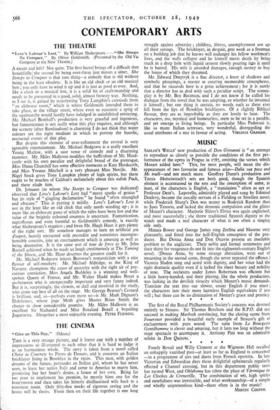CONTEMPORARY ARTS
THE THEATRE
"Love's Labour's Lost." By William Shakespeare. "She Stoops
A RIGHT and left? Not quite. The first barrel brings off a difficult shot beautifully; the second by being over-fussy just misses a sitter. She Stoops to Conquer is that rare thing—a comedy that is old without being in the least obsolete. It is like an old clock or an old musical box ; you only have to wind it up and it is just as good as ever. And, like a clock or a musical box, it is a solid bit of craftsmanship and needs to be presented in a good, solid, almost frowsty way. Nothing, as I see it, is gained by transferring Tony Lumpkin's carousals from " an alehouse room," which is where Goldsmith intended them to take place, to the village street, where even so eccentric a sprig of the squirearchy would hardly have indulged in uninhibited roistering. Mr. Michael Benthall's production is very graceful and ingenious, but fantastication is not really what this play requires, and although the scenery (after Rowlandson) is charming I do not think that water colours are the right medium in which to portray the bucolic, nocturnal events of this play. But despite this element of over-refinement the revival is very agreeable entertainment. Mr. Michael Redgrave is a really excellent Young Marlow, with a sure sense of comedy and a disarming stammer. Mr. Miles Mallcson modifies the bufferdom of Mr. Hard- castle with his own peculiar and delightful brand of the grotesque, Miss Diana Churchill has some effective moments as Kate Hardcastle, and Miss Yvonne Mitchell is a very pleasant Miss Neville. Mr. Nigel Stock gives Tony Lumpkin plenty of high spirits, but there ought to be touches of Caliban's melancholy about this oafish Puck, and these elude him.
Dr. Johnson (to whom She Stoops to Conquer was dedicated) observed that Love's Labour's Lost had "many sparks of genius" but its style of " gingling declamation" he found "often entangled and obscure." This is putting it mildly. Love's Labour's Lost is not in the least like an old clock that only needs winding up ; it is more like an elaborate game of which the rules have been lost and the value of the brightly coloured counters is uncertain. Fantastication, superfluous and even harmful to Goldsmith's comedy, is exactly what Shakespeare's requires ; and from Mr. Hugh Hunt it gets plenty of the right sort. He somehow manages to turn an artificial ieu d'esprit, heavily encrusted with recondite and sometimes incompre- hensible conceits, into an entertainment which is amusing as well as being decorative. It is the same sort of tour de force as Mr. John Burrell achieved when he made us laugh continuously at The Taming of the Shrew, and Mr. Hunt deserves the greatest credit for it.
Mr. Michael Redgrave injects Berowne's romanticism with a nice flavour of self-mockery. Mr. Michael Aldridge, as the King of Navarre. champions the cause of austerity with the right air of pre- carious conviction, Miss Angela Baddeley is a winning and well- spoken Queen of France, and Mr. Walter Hudd makes Boyet a go-between who is unexpectedly important and very funny indeed. But it is, surprisingly, the clowns, so dull and involved in the study, who come out best of all on the stage. Mr. George Benson's Costard is brilliant, and, so—perhaps even more so—is Mr. Mark Dignam's Holofernes, whose page Moth gives Master Brian Smith the chance to show considerable promise. Mr. Miles Malleson is an excellent Sir Nathaniel and Miss Rosalind Boxall a beguiling Jaquenctta. Altogether a most enjoyable evening. PETER FLEMING.






































 Previous page
Previous page